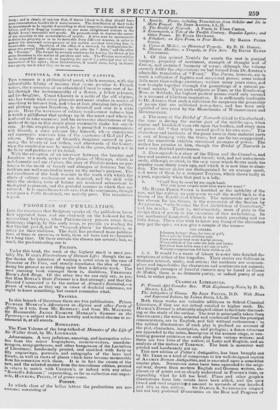POETRY.
In which class of the belles lettres the productions are nu- merous; consisting of
1. Xeniola. Poems, including Translationsfrom Schiller old De la Motte Fouqui. By JOHN ANSTER, LL.D. 'I The Bridal qf Naworth. A Poem, in Three Cantos. 3. Errnangarde, a 7'ale of the Twelfth Century; Royalist Lyrics ; arid Other Poems. By ELIZA HEYWOOD. 4. Ethelbert; an Epic Poem, in Four Books. By BAKES PETER Sufra. .5. Cosmo de11redici ; an Historical Tragedy. By R. H. HORNE. 6. Marcus Manlius; a Tragedy, in Five Acts. By DAVID ELWIN COLOMBINE.
I. Of this quintet Xeniola far excels the rest in poetical imagery, propriety of sentiment, strength of thought and of diction, and sustained harmony of verse; although the volume scarcely fulfils the expectation, we had formed from Dr./tears:it's admirable translation of " Faust." The Poems, however, are in truth a collection of fugitive and occasional pieces; some indeed little more than college exercises, written many years since, and now brought together through the promptings of a natural pa- tornal anxiety. Upon such subjects as Time, or the Everlasting Rose, or Solitude, the highest poetical genius could only succeed in a moment of felicitous inspiration. It is sufficiently creditable to Dr. ANSTER that such a collection far surpasses tine generality of poems that are published now-a-days, and has been only equalled of late years by the 'Miscellanies of WORDSWORTH and MONTGOMERY.
.2. The scene of the Bridal of _Vaicorth is laid in Cumberland; the time is during the earlier part of the middle ages, when rapine and bloodslisd were rife upon the borders, and every man of power did " that which seemed good in his own eyes." The characters and incidents of the poem have in their material parts a sort of keeping with the times, but are far too exaggerated; awl the execution exhibits occasional passages of power. The author has promise in him, -though the Bridal of ..Vatcorth is not a very finished performance.
3. Erniungarde is a story of the Rhine and the Crusades, and love and sorrows, and death and burial; told, and not unharmoni- ously, although overtold, in the easy verse'which SCOTT made too popular soine thirty years ago, and which it is now time to aban- don. The minor pieces are distinguished by an average merit, tuid many of them by a rampant Toryism, which shows badly in a poet, especially when that poet is a lady.
4. "Could Troy be saved by any single hand. This gray goose weapon must have made her stand."
Mr. BAKER PETER SMITH is horrified at the infidelity of the wee, and has written an epic poem to call the world back to the bosom of the Established Church. The appropriate subject he
hae chosen for his theme, is the conversion of the Saxons by
Am.:rem:Fe " who became the first Archbishop of Canterbury,"
awl his menks. There unfirtunately, more of piety in the de-ign than of poetry in the execution of this undertakiog. In
the mechanical framework there is too much preaching and too little doing. Thre.e who wish to know any thing of the characters. may get the epic; we can give a sample of the verse—
THE ANGLES.
Inhuman beings ! they, for love of gold, Into captivity their children sold.
Even a savage bear more fearful proves, When robbed of the cubs she bore awl loves; But these base fallen men (sad tale to tell) Without compunction did their children sell.
5. 6. It would be a waste of labour to eater into detailed de- scriptions of either of the tragedies. Their stories are deficient in dramatic interest, unity, and action; the incidents are common- place and improbable; the characters and sentiments not natural; and though passages of forceful rhetoric may be found in Cosmo de Medici, there is nu dramatic poetry, or indeed poetry of any kind, in either piece.


























 Previous page
Previous page